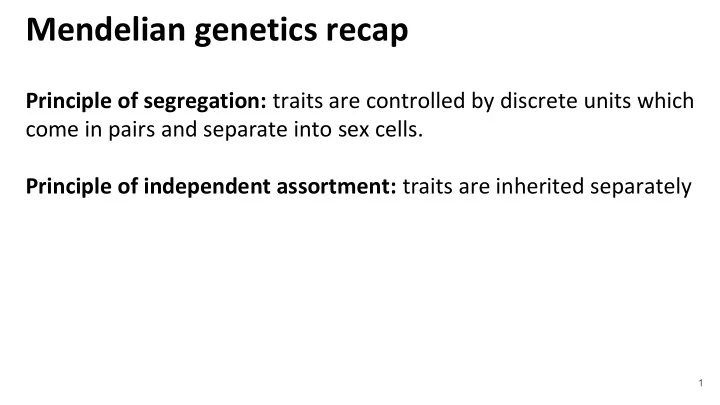

Mendelian genetics recap Principle of segregation: traits are controlled by discrete units which come in pairs and separate into sex cells. Principle of independent assortment: traits are inherited separately 1
Mendelian genetics recap Alleles: variations of a gene Allele pair determines trait Genotype determines phenotype Tt determines tall pea plants XY determines biological sex 2
Mendelian genetics recap Dominant alleles mask the expression of recessive alleles. Homozygous: allele pairs (TT or tt or XX) Heterozygous: alleles pairs (Tt or XY) 3
Punnett square problem Hypothetically, the B allele causes brachydactyly while b alleles cause normal finger length. A man with normal finger length has kids with a woman with brachydactyly (Bb). 4
Types of traits Mendelian traits -discrete traits -one gene determines one trait -rarely influenced by environment 5
Polygenic traits -continuous -multiple genes determine one trait -relationship between genetics/environment heavily influential 6
Synthetic theory of evolution Synthesis of Darwin’s theory and Mendelian genetics into modern evolutionary biology Evolution definition: change in the allele frequencies of a population from one generation to the next. Two-stages of evolution involve variation and natural selection Stage 1: processes produce and redistribute variation Stage 2: Natural selection acts on variation 7
Processes of evolution: mutation Mutations: any change in alleles -produces new alleles (only source of new genetic material) -only passed on if occurs in gametes E.g., sickle-cell anemia due to point mutation (changes in a single nucleotide base). 8
Processes of evolution: recomb Recombination: -chromosome pairs exchange DNA during meiosis -greater genetic diversity for natural selection to act on 9
Processes of evolution: genetic drift Genetic drift: changes in allele frequencies due to chance -large effect on smaller populations 10
Processes of evolution: genetic drift Examples of drift: Founder effect: small subpopulation leaves to find new population E.g., polydactyly in Amish communities -founders/immediate descendants = carriers -homozygous recessive individuals emerged in gene pool 11
Processes of evolution: genetic drift Examples of drift: Bottleneck: population shrinks and recovers -new population reflects genetic diversity of survivors E.g., 60% Pingelap islanders are colorblind -Population descend from a single survivor of a typhoon -carrier 12
Processes of evolution: gene flow Gene flow (migration): gene exchange between populations E.g. Mutt versus purebred dogs 13
Stage two Natural selection: directional change in allele frequencies relative to environmental context -acts on variation produced and redistributed by mutations, recombination, drift, and migration 14
Anthropology example Normal dominant allele = Hb A Mutated recessive allele = Hb S Mutated hemoglobin collapses red blood cells into sickles leading to anemia and death 15
Anthropology example Expect: selection against Hb S (sickle-cell allele) because it causes anemia Instead: 30% population have the sickle-cell allele in some areas 16
Anthropology example Malaria: deadly parasitic infection spread by mosquitoes Correlation: regions malarial pressure and high Hb S allele frequencies 17
Regions of note Mediterranean, Arabian peninsula, Southeast Asia, W. Africa Biocultural evolution example Agriculture: deforestation and standing water -mosquito breeding areas overlap with human settlements 18
Recommend
More recommend